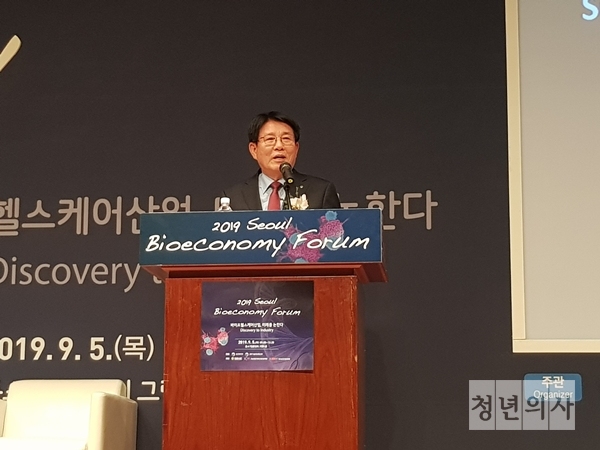“We will broaden open innovation toward the academic sector and expand our business scope to central nervous system diseases so that we can become an innovative drug developer.”
So said Yuhan Corp. CEO Lee Jung-hee on the company’s vision for R&D during an industry event on Thursday.
Lee spoke on Yuhan’s achievements since 2015 and business plans at 2019 Seoul Bioeconomy Forum, held in Yeouido, Seoul. The Ministry of Health and Welfare and the Ministry of Science and ICT organized the event.

Since taking office in 2015, Lee has pursued innovation to develop new medicines. He set up a clear vision that the company would become a multinational pharmaceutical firm through enhanced R&D. Some critics said Lee was being reckless because the company seemed to have insufficient capacity and experience in R&D.
However, his push led to a surprising outcome. The company clinched four licensing-out deals in five years. Yuhan licensed out the sales rights of YH14618, a drug candidate for degenerative disc disease, to Spine Biopharma in July last year, and lazertinib, to Janssen in November. The company also agreed to license out a candidate treatment of Nonalcoholic steatohepatitis (NASH) to Gilead in January, and to Boehringer Ingelheim in July. The four deals are worth 3.5 trillion won ($2.8 billion) in total.
The keys to achieving quick results in a short period lied in transforming corporate culture, encouraging open innovation, and establishing solid trust with global pharmaceutical companies, Lee said.
Lee also ventured to deviate from the conventional ranking and salary table to recruit global talents.
“It is tough for a Korean company to hire a global professional. To recruit a research head, we offered a higher salary than that of the CEO. We gave a position of director to a person who was around the age of a manager,” he said. “Employing such talented people pushed us to grow fast.”
Lee also delegated his authority boldly to speed up the decision-making process, which had been slow because Yuhan was a large company. He divided half the power to the research head with 25 percent and the chief financial officer with 25 percent. If the three of them agreed on something, the company was able to execute the investment decision.
“If the investment exceeds a certain level, it needs the voting of the board of directors. For other decisions to be made as soon as possible, however, I tried to make the most of the delegation of authority,” he said.
Lee noted that open innovation with biotech startups has also helped Yuhan to achieve efficient results under limited resources. The company actively used their ideas and platform technologies.
"Since 2015, we have invested about 200 billion won in 23 venture companies for about five years," he said. “We processed research quickly, and we were able to see fruitful results in a short time.”
NASH treatment candidate YH25724, recently licensed out to Boehringer Ingelheim, is the epitome of Yuhan’s open innovation. Yuhan initially developed YH25724 as a treatment for diabetes and obesity. However, the company accepted the advice of Boehringer Ingelheim’s research head, who visited Yuhan and changed the desired indication to NASH. As the company switched the target to NASH, it introduced the technology to combine GLP-1 and FGF21 from Genexine. Binex developed the clinical sample.
Aggressive investment in open innovation almost doubled the number of Yuhan’s pipelines from 14 in 2015 to 27 this year.
A stable relationship with global drugmakers also contributed to clinching licensing-out deals.
Yuhan has had a co-promotion contract with Gilead since 2001. Since the company decided to focus more on R&D in 2015, seven board directors, including Lee, visited Gilead for help, he said. “As Gilead offered lots of help, the two companies built a good relationship,” he added.
The company also received help from the research head of Boehringer Ingelheim who visited Yuhan and gave advice. “We accepted his advice to develop the drug. After about four years of collaboration, Boehringer Ingelheim bought our technology,” Lee said.
Yuhan plans to speed up the clinical trial of lazertinib and expand new drug business towards central nervous system disease treatments this year.
To do so, the company will broaden the scope of open innovation in the academic industry. Yuhan signed an agreement with Sungkyunkwan University for joint new drug development and decided to invest 6 billion won in Imnewrun, a research institute established by former Yuhan research head Kim Han-joo and two professors of Sungkyunkwan University.
Separate from Janssen’s combination therapy test using lazertinib, Yuhan plans to conduct a phase-3 study on the monotherapy of lazertinib. It is the first time for the company to work on a global phase-3 trial alone. Yuhan predicts that the phase-3 research will cost about 100 billion won.

